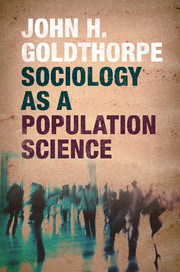Book contents
- Frontmatter
- Dedication
- Contents
- Acknowledgements
- Introduction
- 1 Sociology as a population science: the central idea
- 2 Individual variability in human social life
- 3 The individualistic paradigm
- 4 Population regularities as basic explananda
- 5 Statistics, concepts and the objects of sociological study
- 6 Statistics and methods of data collection
- 7 Statistics and methods of data analysis
- 8 The limits of statistics: causal explanation
- 9 Causal explanation through social mechanisms
- Conclusion
- References
- Index
5 - Statistics, concepts and the objects of sociological study
Published online by Cambridge University Press: 05 December 2015
- Frontmatter
- Dedication
- Contents
- Acknowledgements
- Introduction
- 1 Sociology as a population science: the central idea
- 2 Individual variability in human social life
- 3 The individualistic paradigm
- 4 Population regularities as basic explananda
- 5 Statistics, concepts and the objects of sociological study
- 6 Statistics and methods of data collection
- 7 Statistics and methods of data analysis
- 8 The limits of statistics: causal explanation
- 9 Causal explanation through social mechanisms
- Conclusion
- References
- Index
Summary
Statistics has to be regarded as foundational for sociology as a population science in the sense that, as the means through which population regularities are established, it actually constitutes the explananda or ‘objects of study’ of sociology – although always in conjunction with the concepts that sociologists form.
In a population science, whatever its substantive concerns, statistical methods will be required in the primary task of establishing the extent and form of population regularities. In sociology understood as a population science, statistics does indeed contribute crucially in this way in regard to both data collection and data analysis – as I will argue at some length in Chapters 6 and 7. It is, however, important that prior consideration should be given to a further and deeper sense in which statistics is foundational for sociology.
In this connection, a paper by a leading historian of statistics, Stephen Stigler (1999: ch. 10), provides key insights. Stigler seeks to bring out the significant differences that exist between the part that has come to be played by statistical methods in the social sciences and the uses to which such methods had previously been put in various natural sciences.
Stigler begins by noting that statistical methods were quite widely drawn on in astronomy from the eighteenth century onwards. This was, however, for a very specific purpose: namely, that of handling observational error. In studying the positions and movements of celestial bodies, astronomers believed that they had a correct theory to guide them – the Newtonian theory – and the prime purpose of the observations they made was to allow them to quantify this theory in its particular applications. For example, given that Jupiter travelled around the sun in an ellipse, what they wished to know were the coefficients of the equation for that ellipse. In pursuing work of this kind, astronomers did, however, face the difficulty that different observers, or perhaps the same observer on different occasions, produced different results: that is to say, astronomical observations were subject to error. Statistical methods were then seen as the solution – as the means, in effect, of separating truth from error.
- Type
- Chapter
- Information
- Sociology as a Population Science , pp. 58 - 69Publisher: Cambridge University PressPrint publication year: 2015



